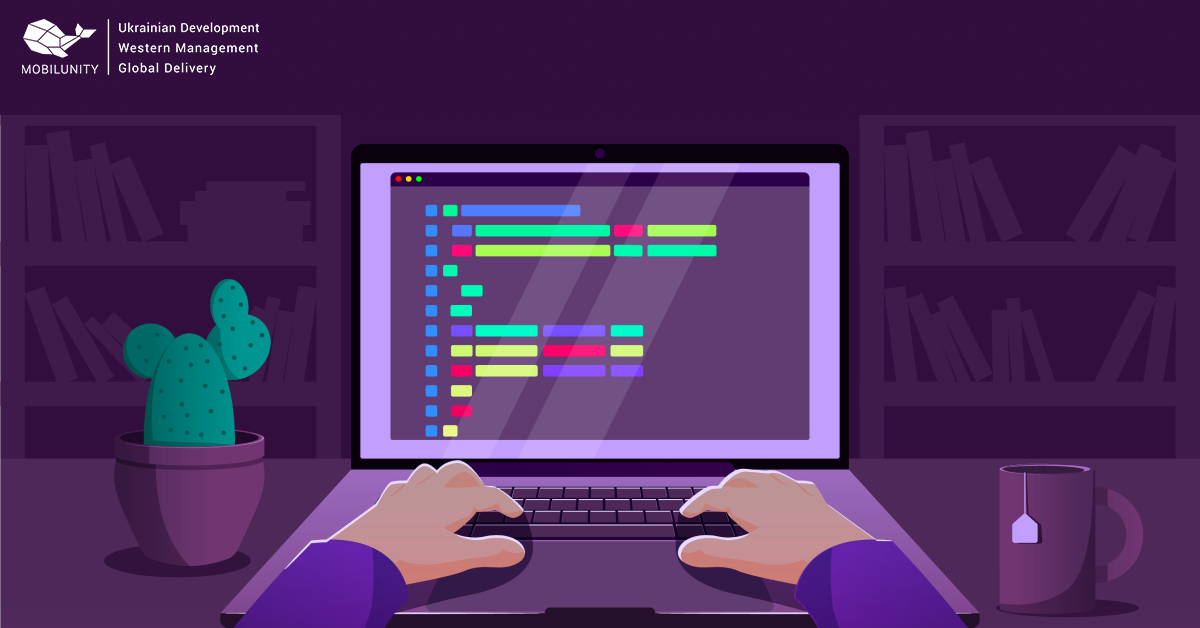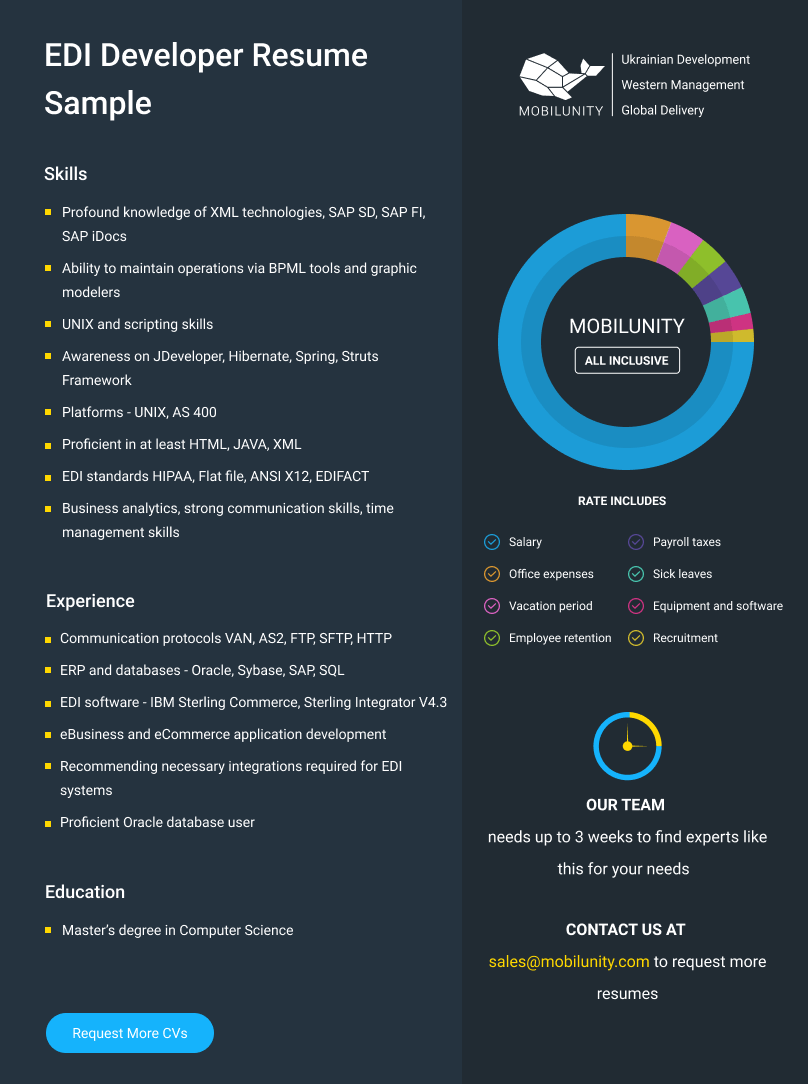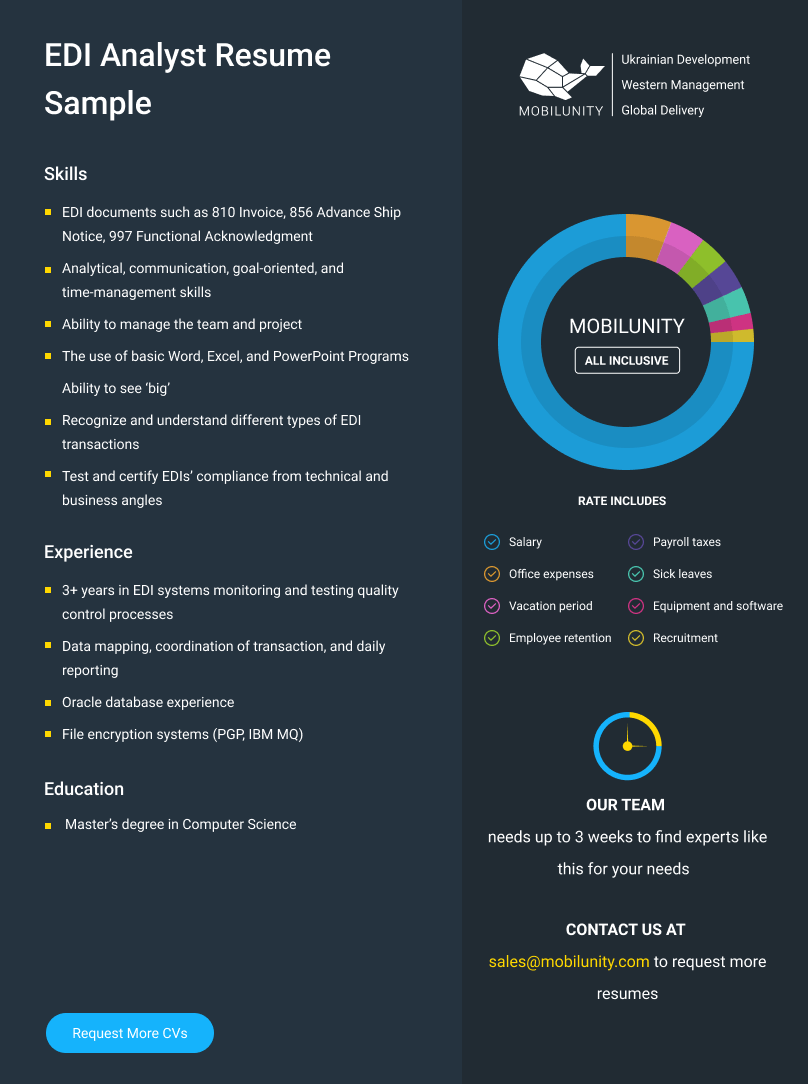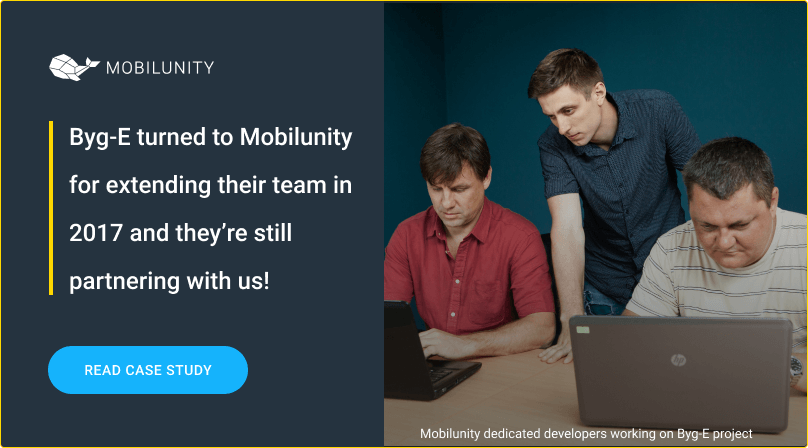Hire EDI Developer for Successful EDI Integration

EDI integration services stand for Electronic Data Interchange and refer to the process of exchanging the data electronically between the company service-provider and a client. By conducting the operations in an electronic mode, businesses save time on the processing, reduce potential errors that might occur, and create smooth cooperation with partners.
How Do EDI Integration Solutions Work?
EDI, as a fully integrated solution, is applied in every industry that deals with information transitions; these include but are not limited to manufacturing, healthcare, pharmaceutical, eCommerce, and retail domains. Since all the data of an organization is stored in the ERP system, companies find ERP developers to extract this data and integrate it into EDI.
Instead of using fax or email information exchange, which involves people, thus increases the occurrence of error and slows down the process, the documents are transferred in EDI document format through the system. There are 3 steps of EDI integrations:
Step 1: Preparation
Before any invoices, shipment, or other purchase-related information is sent, the company properly collects and organizes it. This process may include manual entry, extraction of data from the database, data conversion (changing the format from doc to PDF or other execution), and adding other components to make the document ready to go.
Step 2: Create the EDI Format
EDI software development translates the internal data into the EDI standard. The software allows processing a big number of documents that speed up the transaction and boosts the process of data exchange.
Step 3: Send EDI Documents
In this phase, you are to choose the way your documents are connected to your partner: via AS2 or other preferable IP, directly to your partner’s EDI network, or combine two options depending on the volume of the documents that need to be exchanged.
Common Types of EDI Integrations
In order to satisfy the needs and goals of both parties in a partnership, there are several numerous types of EDI enterprise data integration, each of which specifically hits the required objectives.
- QuickBooks – an online accounting system that allows users (especially SMEs) to manage payment operations, conduct pay bills, and store other billing-related information on the cloud-based premises. Quickbooks EDI integration allows companies to automate the selling process and facilitate transactions making them secure and fast.
- Salesforce – remains the leading CRM used by companies globally. Since most large-scale organizations carry out a tremendous amount of documentation, they require the exchange to be fast and secure. Therefore, one of the reasons for Salesforce integration with EDI is to meet the needs of their partners, secure the data, and comply with the inquiry to keep the partner.
- NetSuite EDI integration – since NetSuite covers a huge number of functions in ERP, EDI integration is crucial to transfer credential information, maintain CRM, and exchange the purchase-related data.
- Epicor – corporation that specializes in B2B operations, making companies grow and promote their products/services. Epicor EDI integration guarantees automated and integrated software solutions for B2B transactions.
- Amazon – a huge corporation that deals with eCommerce, logistics operations, hardware, data storage, and other services provided for a variety of industries. Amazon EDI integration is crucial for conducting 1) speedy data exchange, 2) security, 3) handles loads of processes simultaneously.
- Oracle® EDI integration – Oracle® is second in size after Microsoft software development provider in the world. The corporation manages tremendous databases and spreadsheets, goes through dozens of financial deals, and other operations that require EDI.
- EDI ERP integration – in order to transform all enterprise paper documentation, it is necessary to introduce EDI to customize and maintain the crucial processes.
- SAP® – is a common software that allows organizations to plan the resources, that include but not limited to production, sales, HR, finances. EDI SAP® integration creates a unified system of operations and guarantees the data flows smoothly.
The Role of EDI Developer and Who Is EDI Integration Analyst
If you decided to level up your operations and integrate them with the use of EDI, you should know what exactly an EDI specialist will do.
- Manages FTP (file transfer protocol) networking to make sure the connection is properly established and functions with no delays
- EDI transitions map development, testing, and implementation
- Updates and maintains documentation of a company
- Makes sure EDI standards match the industry’s standards
The implementation of EDI is not only limited to developers, but a lion’s share of the process is carried out by EDI analyst. One of his/her roles is to review business requirements and integrate them into the technical-related aspects of EDI. Moreover, in order to make sure the system is operating, the EDI analyst also runs test cases. Other than these, the person in this position also carries out daily system maintenance. The tables below demonstrate the profile of a candidate for EDI design and development.
EDI Developer Resume Sample
EDI Analyst Resume Sample
ERP and EDI Integration with Mobilunity
Mobilunity, as a reliable nearshoring vendor on the Ukrainian IT market, will hire you skilled talents on the market to satisfy your EDI needs. Ukraine has been an appealing destination for hiring IT specialists for countries like Japan, Switzerland, Canada, and Mobilunity does not stand aside.
Byg-E is one of the successful integration projects in cooperation with Denmark. In 2017, they requested their team to be extended with Ukrainian software developers to maintain the services of electronic trade as well as assist in the efficient production of documentation. The biggest challenge of the company is that they manage 2 tremendous systems, 16 subsystems that need to be handled properly.
“EDI can become the formal language of absolutely all business processes. With clear standards EDI allows you to exchange any documents – from commercial proposals and product catalogs to invoices, from formal fiscal documents to working correspondence within departments. This concept is applicable to the business segment, whether it’s B2B or B2C, as well as to the exchange of any documents between business structures and governmental (for example, fiscal) organizations.”
Mykhailo, Application Support Specialist/QA at Byg-E Ukrainian Team
According to the feedback of Byg-E, Mobilunty’s developers provided quality services, maintained excellent communication, and clear task understanding that led to prosperous collaboration.
“We found Mobilunity and have learned that not only are their IT specialists very professional and qualified but they come at a very fair price. Working with them for over a year now has proved to be more easy than expected and it didn’t take long for them to deliver the results we hoped for. We are very satisfied with Mobilunity which provide a good workforce with good facilities.”
Paul Jacobsen, IT Manager at Byg-E
With Mobilunity you:
- Build your team from scratch within 3-6 weeks as well as have an opportunity to scale up or down.
- Receive constant communication and reporting system via Agile methodologies.
- Can be sure of teams’ satisfaction as we take care of their retention.
- Feel free to schedule personal visits to get closer with your developers.
- Handle all project’s control by yourself.
We manage the recruitment process and fulfill numerous positions: we can hire machine learning developer, QA engineers or hire SaaS developers, and other specialists to meet your needs.
Still holding back your growth? Hire EDI developer at Mobilunity to jump-start integrating your data and fortify your partnerships!
Disclaimer: All salaries and prices mentioned within the article are approximate NET numbers based on the research done by our in-house Recruitment Team. Please use these numbers as a guide for comparison purposes only and feel free to use the contact form to inquire on the specific cost of the talent according to your vacancy requirements and chosen model of engagement.









